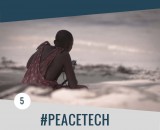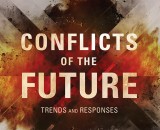Women, War, and Peace: An Interview with Abigail Disney
BP: How do audiences in the United States react to your films?
Disney: Audiences in the United States don’t think of themselves as part of the country that’s fighting in a war. This is a terrible tragedy for us as a country, and it’s a crime against the people who are out there risking their lives and fighting all the time. We cannot forget the wars we are fighting. That’s why there should be a draft and a war tax, so that the people who are paying the highest price for the war, their lives that is, will not all come from a separate, easily forgotten class. It will be the responsibility of all of us.
BP: How do men react to your films?
Disney: We’ve actually shown the film to three or four different all-male schools, and it’s been a very interesting experience. One question invariably comes up, “Why are there no good men in your film?”
I always say there are lots of good men in the film if you really watch. Men are carrying grandmothers on their backs, helping refugees, and finding water. Men are all over the place doing good things. I then turn the question back to the male audience and ask why they didn’t notice them. Why does a small, good deed by a man go unnoticed? Must men be showcased doing the big, important, highly visible deed?
This connects to peacebuilding. In making peace, there is no room for the hero narrative and we all need to understand and accept this. Peace comes because people make a decision to stop fighting. We need to begin understanding leadership not as big, heroic moments but as the ability to move people in the right direction.
BP: This relates to UN Security Resolution 1325 and the formal role of women as peacemakers, builders, and leaders. Despite the passage of 1325, why aren’t we seeing women’s roles expanding?
Disney: 1325 is important but I think it can seem lofty and lack concreteness. The value of documentary films is that they offer a concrete picture of what 1325 is meant to embrace and encourage. We have heard from peacebuilders that the films provide tangible evidence of what is possible and the impact women can have.
BP: How can documentary films contribute to social change? You just mentioned one, which is making abstract ideas more concrete.
Disney: Starting out, the goal was to use documentary film to make women visible. They’re never going to matter in the future if we can’t show the way they mattered in the past both to themselves and to others.
However, once the film was made and we starting showing it worldwide, I realized it was serving a different, unintended purpose: to motivate women to act in their own contexts. Even if women haven’t been through conflict themselves, they have the same experience of being blocked from processes. They know what it is to yell and yell and never be heard, and they are motivated by the planfulness of the Liberian women in Pray the Devil and they want to talk strategically about creating change in their own environments. I did not expect that our films would unlock so many other movements.
...continue
